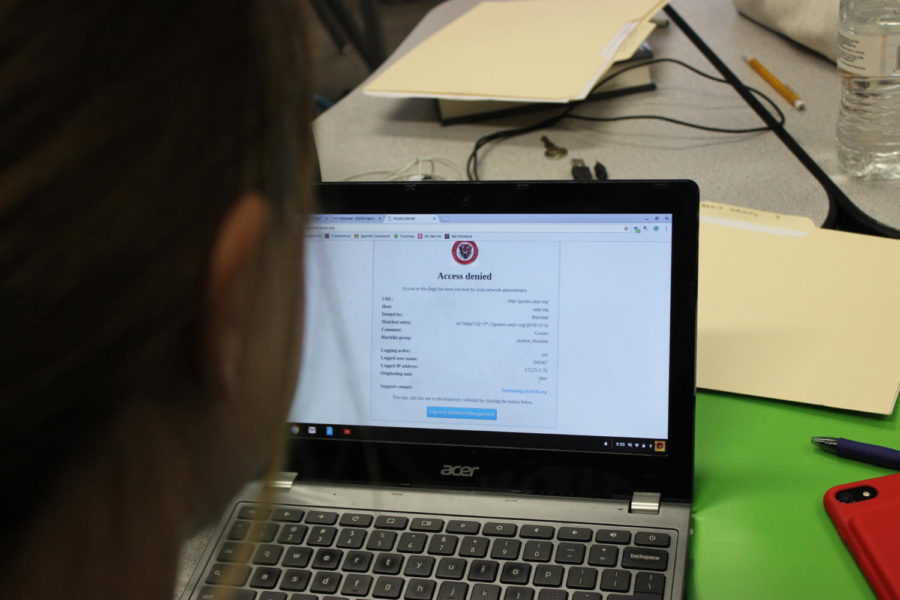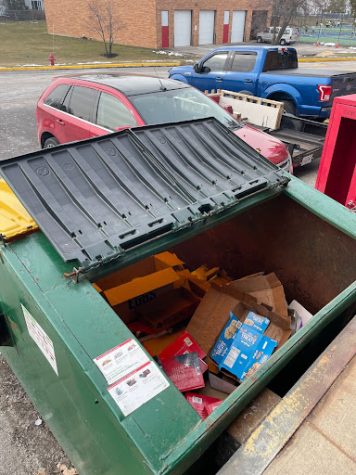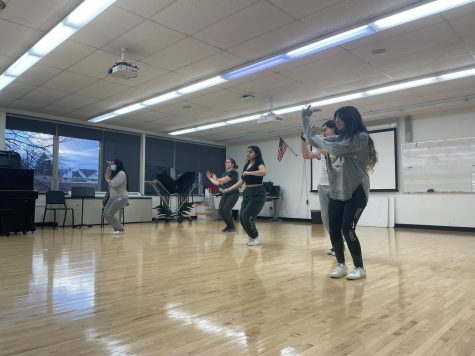Access Denied: MHS Students Face Numerous Web Restrictions
October 13, 2017
The number of websites blocked on student computers have some students annoyed.
“I feel like there’s a lot of websites that are blocked off for no reason, and sometimes I’m trying to get information on certain topics that are appropriate for school, but… I can’t get to them since they are blocked off,” said Junior Melanie Umbdenstock.
Students like Umbdenstock said they feel like they have the right to some distracting websites as long as they keep off of them during school hours.
“Sometimes I’m just trying to use my computer at home for personal reasons, school appropriate, maybe go [to] online shopping websites, and they’re blocked for inappropriate reasons, so [occasionally] I can’t go on regular [websites], and it gets a little annoying,” said Umbdenstock.
While some students want access to websites for personal reasons, others argue some of the blocked websites are beneficial, even if they are technically games.
“I think that they should unblock the games websites because I want to play games on my chromebook at home not at school,” said Junior Clarissa Wienckoski.
Wienckoski added the games she would liked unblocked revolve around math.
“I’m trying to further my math education, but [the restrictions] don’t allow me to,” she said.
While the student chromebooks were originally given for the purposes of completing school work and making the use of technology in the school easier, some students call the blocking off of certain websites unfair , and many of the students with these concerns also have said they are not asking for access to inappropriate websites because they understand that part of the school’s responsibility is keeping student computer use appropriate for a learning environment.
“I think there still should be websites that are blocked, but I think a lot of them are unnecessary, and they should just ease up on the restrictions a little bit,” said Umbdenstock.
School administration, though, have a legal responsibility of preventing students from accessing certain websites.
“Inappropriate websites are ones that schools must block by law: pornography, gambling, violence. Distracting websites may be ones that host games– not detrimental to the student but a waste of school time. Unsafe websites would be ones that include hacking software, such as proxies. These sites threaten the consistent and reliable network,” said Principal Dr. Anthony Kroll.
When students try to access a blocked website on their chromebook the words “Access denied” shows up on the screen. That’s because a third-party hired by the school has determined it is unacceptable for school based on the following criteria.
“D120 purchases a firewall application from a vendor. Then [the] vendor determines what should be filtered by 1) that we are a school and by law must have certain things blocked… 2) by any requests from us to block particular sites and 3) sites that the application employees become aware of,” said Dr. Kroll.
While some of the blocked websites could be used for research purposes, they might contain explicit language that gets flagged. Additionally, research cannot be conducted on social media sites, as these have been blocked for students as well.
“I think that they have taken it a little too far because…[I feel like] every other website is blocked when [the websites] don’t need to be” said Wienckowski.
While website restrictions are not new to MHS, students have said they feel as though there are more blocked websites being blocked by the school. This isn’t because the school administration has added new restriction requirements; it’s because new websites are created daily.
“The general categories [that determine what gets blocked] have never changed,” said Dr. Kroll. “However, the most noticeable time is when a new website or application is introduced to society.”
In addition to students being frustrated by blocked websites, they have also expressed frustration with wifi restrictions.
“With the sheer number of phone applications (as one example) that a student needs WiFi, multiplied by 2,000 students, the WiFi demand would be overwhelming for our network,” explained Dr. Kroll. “MHS has had times when students were on the WiFi; however, due to the volume of traffic, the network runs slowly and inefficiently.”
As a result, the school administration limits WiFi access as a way to benefit everyone at the school–staff and students.
But if students have suggestions, specifically on what websites should not be blocked of, then all the student has to do is speak up about the problem.
Said Dr. Kroll, “When [the school] receives a request [from a staff member or student], the request, website and content are reviewed.”


![MHS Alum Trey Baker hosting a MBK rising event on February ninth at the MHS annex. Said Baker, “I’m just really excited [and] super grateful for the community of Mundelein, for our educators, for our administration, at MHS who are really buying into this.”](https://mhsmustang.com/wp-content/uploads/2023/03/TreyBaker-350x475.jpg)

